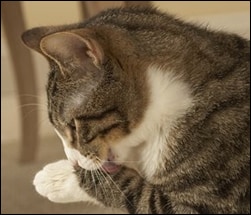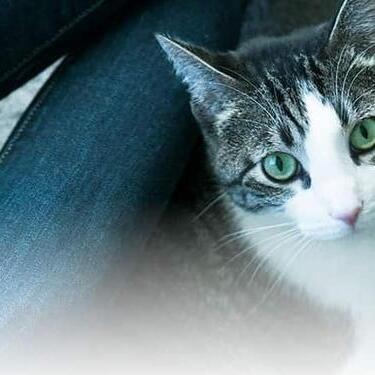
-
Find the right food for your pet
Take this quiz to see which food may be the best for your furry friend.
Find the right food for your pet
Take this quiz to see which food may be the best for your furry friend.
Featured products
 Adult 7+ Perfect Digestion Chicken, Whole Oats & Brown Rice Recipe Dog Food
Adult 7+ Perfect Digestion Chicken, Whole Oats & Brown Rice Recipe Dog FoodScience Diet's breakthrough nutrition supports ultimate digestive well-being & healthy microbiome for dogs age 7+
Shop Now Small & Mini Savory Stew with Chicken & Vegetables Dog Food
Small & Mini Savory Stew with Chicken & Vegetables Dog FoodA delicious complement to the nutrition of Science Diet Small & Mini 7+ dog food
Shop Now Adult Healthy Cuisine Roasted Chicken, Carrots & Spinach Stew Dog Food
Adult Healthy Cuisine Roasted Chicken, Carrots & Spinach Stew Dog FoodDelicious roasted chicken paired with tender vegetables in a succulent stew
Shop NowFeatured products
 Adult 7+ Tender Tuna Dinner Cat Food
Adult 7+ Tender Tuna Dinner Cat FoodWith delicious chunks in a decadent gravy
Shop Now Adult Savory Entrée Can Variety Pack Cat Food
Adult Savory Entrée Can Variety Pack Cat FoodPrecisely balanced nutrition with the delicious taste of savory minced chicken to help fuel the energy needs of cats during the prime of their life
Shop Now Adult 7+ Senior Vitality Chicken & Vegetable Stew Cat Food
Adult 7+ Senior Vitality Chicken & Vegetable Stew Cat FoodImproves Everyday Ability to Get Up & Go
Shop Now -
Dog
- Dog Tips & Articles
-
Health Category
- Weight
- Food & Environmental Sensitivities
- Urinary
- Digestive
- Joint
- Kidney
-
Life Stage
- Puppy Nutrition
- Adult Nutrition
- Senior Nutrition
Cat
- Cat Tips & Articles
-
Health Category
- Weight
- Skin & Food Sensitivities
- Urinary
- Digestive
- Kidney
-
Life Stage
- Kitten Nutrition
- Adult Nutrition
Featured articles
 Why Are Dogs and Cats So Cute?
Why Are Dogs and Cats So Cute?If waggy puppy dog tails and furry kitten yawns make you swoon, you're not alone. Why are cats so cute? And, dogs too! Let's find out!
Read More Do Dogs and Cats have Belly Buttons?
Do Dogs and Cats have Belly Buttons?Learn whether cats & dogs have belly buttons like humans, what the function is, and if there are any health concerns associated with it.
Read More Does My Pet Hate Me?
Does My Pet Hate Me?Learn tips for bonding with your pet if you've ever thought, 'My dog doesn't like me, or 'Why do I have a standoffish cat?'
Read More -


You may catch your cat licking her paws or chewing on herself from time to time. Why do cats clean themselves? Self-grooming is a trademark characteristic of most cats that begins right after birth. Mothers lick their kittens to clean them, provoke urination and suckling, provide comfort, and strengthen their bond. At 4 weeks of age, kittens begin grooming themselves, and shortly thereafter start grooming their mother and littermates. This self-grooming and mutual grooming (referred to as allogrooming) continues into adulthood.

All the right parts
Cats are flexible, strategic, and well-equipped for grooming. Everything from the rough surface of a cat's tongue to her sharp teeth, comb-like paws, and forepaws add up to a finely tuned grooming machine. A cat can even use her front paws to stimulate tiny oil glands on her head. The oil is a cat's "perfume" and is spread all over the body.
Why do cats groom?
Cats groom themselves not only to keep clean, but for several other health reasons:
- To regulate body temperature
- To keep her coat clean and smooth by distributing natural skin oils
- To stimulate circulation
- To cool herself down through evaporation of saliva
- To eliminate parasites, infection, and allergies
- To prevent hairballs (Click here for more about dealing with cat hairball problems)
- Displacement behavior: If your cat feels embarrassed, anxious, or as though she’s in a conflict, she may lick to calm herself.


Tasty Tips
Compulsive grooming
Does your cat seem to be licking, biting, or nibbling herself incessantly? Keep in mind that most cats spend between 30 and 50 percent of their day grooming themselves. But if you start to notice obsessive grooming, hair loss, or skin lesions, it may be time for a visit to the vet.
Compulsive grooming may be the result of a medical condition. It could indicate a neurological disorder, flea infestation, parasites, or a psychological disorder. Stress often causes cats to develop compulsive disorders like excessive grooming early in life. Events like moving, home remodeling, a new pet or family member, separation anxiety, and lack of stimulation can trigger these behaviors. And because self-grooming soothes and calms your cat, she will want to do it every time she’s faced with a conflict. If the behavior is not addressed, it can result in self-inflicted injury. For instance, psychogenic alopecia, or fur plucking, is a common condition that includes hair thinning, balding, and skin infections.
Under-grooming
Regular self-grooming will help your cat look good and feel good, but if she becomes ill, she may stop cleaning herself. This could be a sign of arthritis, pain, or dental problems. Cats who are taken away from their mothers too early may also not know how to properly clean themselves.
Watch for these warning signs of under-grooming:
- A harsh or greasy coat
- Small mats of fur on her body or tail
- Staining on the paws from urine or residue
- Foul smell
- Food particles on her face or chest after meals
To encourage your cat to begin grooming, start by brushing her daily. Brushing stimulates the skin and blood circulation, and rids her of fleas and ticks. When she starts grooming, try not to interrupt her. It’s important for your cat, so let her make the most of it.


One of our staff authors prepared this article for you
Related products

Supports energy level and beautiful fur in mature cats

With delicious chunks in a decadent gravy

Improves Everyday Ability to Get Up & Go

Precisely balanced nutrition with the delicious taste of savory minced chicken to help fuel the energy needs of cats during the prime of their life
Related articles

Discover the benefits of Hill's line of kitten foods and how they provide complete and balance nutrition for growing kittens.

Discover how to identify cat sensitive skin and what you can do to help your cat thrive from head to paw.

Discover which cat toys games your feline friend might like, and how they are great sources of exercise. Explore our library of articles to learn more.

Brushing your cat's teeth is just as important as brushing your own. Learn signs or oral health problems in your cat and how to avoid them.

Put your cat on a diet without them knowing
Our low calorie formula helps you control your cat's weight. It's packed with high-quality protein for building lean muscles, and made with purposeful ingredients for a flavorful, nutritious meal. Clinically proven antioxidants, Vitamin C+E, help promote a healthy immune system.
Put your cat on a diet without them knowing
Our low calorie formula helps you control your cat's weight. It's packed with high-quality protein for building lean muscles, and made with purposeful ingredients for a flavorful, nutritious meal. Clinically proven antioxidants, Vitamin C+E, help promote a healthy immune system.

